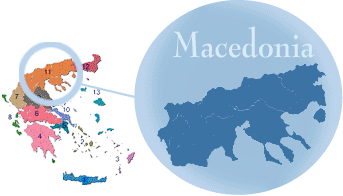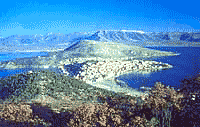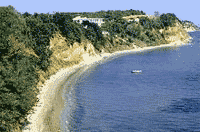
Macedonia has played an important part in world history. Alexander the Great and his Macedonian successors achieved a remarkable acculturation of other peoples, imbuing them so deeply with Greek values that the three century period of their ascendancy became known as the "Hellenistic Period".
This process turned the Greek language into a kind of "lingua franca" of the then known world. This very language became the vehicle for the propagation of the Christian faith. The Old Testament was translated into Greek so that it could be understood by all the peoples of this era who shared the language. The same is true for three of the Gospels and for the "Acts of the Apostles" while the Gospel according to Matthew was translated from Aramaic into Greek. Macedonia served as the springboard for the christianisation of Europe by Apostle Paul whose life-work became the conversion of the nations. He was himself deeply affected by the civilizing achievements of Alexander the Great and his successors. In his home, Greek was spoken while he himself had absorbed the teaching of ancient Greek authors, philosophers and scholars. His mandate to start from Macedonia is reputed to be divinely inspired. ("And a vision appeared to Paul in the night; There stood a man of Macedonia, and prayed him, saying, Come over into Macedonia, and help us." - Acts 16:9). Holzner, the biographer of saint Paul mentions in his book "Paul" the following: "There once came from Macedonia a young hero - Alexander - who brought with him to the East not only his 22 years of age but also the gifts of the West, the Greek language and philosophy. Now, the West was eager to receive the gift of the East, the teachings of Jesus from Nazareth". With the exception of some enclaves of Latin-speaking and other peoples, the fundamentally Greek population of Macedonia remained effectively unchanged until the 7th century A.D., when various Slav races (Drogovites, Strumonites, Sagoudates, and others) began to settle in the area of Macedonia. With the permission of the Byzantine authorities, these tribes formed small Slavic enclaves known to the Byzantines as 'Sclavineae'.
The same is true for three of the Gospels and for the "Acts of the Apostles" while the Gospel according to Matthew was translated from Aramaic into Greek. Macedonia served as the springboard for the christianisation of Europe by Apostle Paul whose life-work became the conversion of the nations. He was himself deeply affected by the civilizing achievements of Alexander the Great and his successors. In his home, Greek was spoken while he himself had absorbed the teaching of ancient Greek authors, philosophers and scholars. His mandate to start from Macedonia is reputed to be divinely inspired. ("And a vision appeared to Paul in the night; There stood a man of Macedonia, and prayed him, saying, Come over into Macedonia, and help us." - Acts 16:9). Holzner, the biographer of saint Paul mentions in his book "Paul" the following: "There once came from Macedonia a young hero - Alexander - who brought with him to the East not only his 22 years of age but also the gifts of the West, the Greek language and philosophy. Now, the West was eager to receive the gift of the East, the teachings of Jesus from Nazareth". With the exception of some enclaves of Latin-speaking and other peoples, the fundamentally Greek population of Macedonia remained effectively unchanged until the 7th century A.D., when various Slav races (Drogovites, Strumonites, Sagoudates, and others) began to settle in the area of Macedonia. With the permission of the Byzantine authorities, these tribes formed small Slavic enclaves known to the Byzantines as 'Sclavineae'.
Throughout the 7th century the Slavs fought the Byzantines and made repeated attacks on Thessaloniki, though without success. In 688 Justinian II won a decisive victory over them, and forcibly removed many of them to Bithynia in Asia Minor. For a long time the Slavs lived peacefully in the European provinces of the Byzantine Empire and, as can be seen from Byzantine writers, many of them were hellenised. After the foundation, in 1870, of an independent Bulgarian church known as the Exarchate, open rivalry broke out between Greece and Bulgaria over which of the two was to dominate Macedonia. In reality, this rivalry focused on the question of the national consciousness among the Slav-speaking masses inhabiting the central zone of Macedonia. According to consular reports of the time, this zone lay between theKastoria-Ptolemaida-Yannitsa-Zichni Serron line in the south and the Ochrid-PrilepStrumnitsa-Meleniko-Nevrokop line in the north.
According to consular reports of the time, this zone lay between theKastoria-Ptolemaida-Yannitsa-Zichni Serron line in the south and the Ochrid-PrilepStrumnitsa-Meleniko-Nevrokop line in the north.
After the Greco-Turkish war of 1897, which proved a disaster for Greece, the Bulgarians managed to win over a considerable proportion of the Slav-speaking inhabitants of Macedonia. Thus it came about that on the feastday (20 July) of the Prophet Elijah in 1903 there was a Bulgarian rising, known as the Iliden rising, which the Turkish army soon bloodly suppressed. This rising led also to the destruction of numerous Greek communities and towns in Western and Northern Macedonia, including that of Krusovo. The rising, however, made plain the danger that Macedonia might be lost for ever, which stimulated a general moblisation on the part of the Greeks. So it came about, in 1904, that the armed'Macedonian Struggle' began, lasting until 1908. During this period, units made up of volunteers from the free Greek state, from Crete and from other as yet unredeemed areas poured into Macedonia in solidarity with the local Greek Macedonian fighters.Together, they managed to check the spread of Bulgarian infiltration and to maintain the predominantly Greek character of the central and southern parts of Macedonia. It should not be overlooked that in many areas the volunteer units were made up principally of Slav-and Vlach-speaking guerrillas, fighting on the side of the Greek cause. Their devotion to the Greek national cause led the Bulgarians to call them 'Graikomans', that is, fanatical Greeks.The reward for the efforts and sacrifices of the participans in the Macedonian Struggle came with the victorious Balkan Wars of 1912-13, by which Macedonia shook off the Ottoman yoke that had lain upon it for five centuries. The Treaty of Bucharest (10 August 1913) finally fixed the frontiers of the Balkan states in Macedonia. The part of Macedonia which came into Greek possession included most of the vilayets of Thessaloniki and Monastir, with the exception of some provinces which today lie within Yugoslavian and Bulgarian Macedonia. The liberation of Macedonia and the widespread movements of population which followed led to the three sections of Macedonia, as incorporated into the three Balkan states, becoming part of the life of the respective countries. This process was neither uniform nor rapid. In Greek Macedonia, the revolutionary ethnological developments led to the emergence of homogeneously Greek population, with only sparse alien elements mainly in border districts.
In Greek Macedonia, the revolutionary ethnological developments led to the emergence of homogeneously Greek population, with only sparse alien elements mainly in border districts.
The Treaty of Lausanne (1923) put an end to the traditional Greek policy of the "Great Idea". This allowed the Greek governments of the inter-war years to turn their attention to the country's domestic affairs and to the building of the modern Greek state. The "new lands", including Macedonia, experienced difficulties at first in absording the influx of refugees but were later to play a leading part in the economic and social upsurge of modern Greece and her people.As for the problem of the other ethnic and linguistic groups left within Greek borders, the Greek government attempted, after the signing of the peace treaties ending the First World War, to keep in line with the atmosphere current in Europe at the time, complying to the letter with all the provisions of the League of Nations minority treaties. Overlooking the fact that the Slav-speakers who had chosen to remain in Greece thought of themselves largely as Greeks, the Greek government of the day agreed, in 1924, to sign with Bulgaria an agreement known as the Kalfov-Politis protocol, by which the Slav- speaking populations left within Greek territory were acknowledged to be Bulgarian. However, this raised such an outcry in the country -not to mention the fact that Serbia reacted by repudiating the Greco-Serbian treaty of alliance of 1913- that the Greek Parliament refused to ratify the protocol and the League of Nations relieved Greece of the obligations she had undertaken by it. After that Greece regarded the remaining Slav-speakers -of whom there were in any case not more than 100,000- as Slav-speaking Greeks, an attitude which was greeted with relief by the vast majority of those concerned since their national consciousness was Greek regardless of what language they might speak.Today Macedonia (Makedonia) is Greece's largest geographical region and it occupies the northern part of the country. Central Macedonia, occupies the central section of Macedonia including the prefectures of Thessaloniki, Chalkidiki, Imathia, Pieria, Pella and Kilkis. In Central Macedonia there are large fertile plains, such as the plain of Thessaloniki, mineral rich areas, such as Chalkidiki, wooded mountains, lakes, wetlands, enchanting waterfalls and forests of fir, pine, and beach trees. Rushing rivers, caves, verdant plains, fertile valleys, distant lake shores, beautiful coast, and large and small fishing villages. The capital is Thessaloniki, named after the daughter of king Philip of Macedonia.
This process turned the Greek language into a kind of "lingua franca" of the then known world. This very language became the vehicle for the propagation of the Christian faith. The Old Testament was translated into Greek so that it could be understood by all the peoples of this era who shared the language.
 The same is true for three of the Gospels and for the "Acts of the Apostles" while the Gospel according to Matthew was translated from Aramaic into Greek. Macedonia served as the springboard for the christianisation of Europe by Apostle Paul whose life-work became the conversion of the nations. He was himself deeply affected by the civilizing achievements of Alexander the Great and his successors. In his home, Greek was spoken while he himself had absorbed the teaching of ancient Greek authors, philosophers and scholars. His mandate to start from Macedonia is reputed to be divinely inspired. ("And a vision appeared to Paul in the night; There stood a man of Macedonia, and prayed him, saying, Come over into Macedonia, and help us." - Acts 16:9). Holzner, the biographer of saint Paul mentions in his book "Paul" the following: "There once came from Macedonia a young hero - Alexander - who brought with him to the East not only his 22 years of age but also the gifts of the West, the Greek language and philosophy. Now, the West was eager to receive the gift of the East, the teachings of Jesus from Nazareth". With the exception of some enclaves of Latin-speaking and other peoples, the fundamentally Greek population of Macedonia remained effectively unchanged until the 7th century A.D., when various Slav races (Drogovites, Strumonites, Sagoudates, and others) began to settle in the area of Macedonia. With the permission of the Byzantine authorities, these tribes formed small Slavic enclaves known to the Byzantines as 'Sclavineae'.
The same is true for three of the Gospels and for the "Acts of the Apostles" while the Gospel according to Matthew was translated from Aramaic into Greek. Macedonia served as the springboard for the christianisation of Europe by Apostle Paul whose life-work became the conversion of the nations. He was himself deeply affected by the civilizing achievements of Alexander the Great and his successors. In his home, Greek was spoken while he himself had absorbed the teaching of ancient Greek authors, philosophers and scholars. His mandate to start from Macedonia is reputed to be divinely inspired. ("And a vision appeared to Paul in the night; There stood a man of Macedonia, and prayed him, saying, Come over into Macedonia, and help us." - Acts 16:9). Holzner, the biographer of saint Paul mentions in his book "Paul" the following: "There once came from Macedonia a young hero - Alexander - who brought with him to the East not only his 22 years of age but also the gifts of the West, the Greek language and philosophy. Now, the West was eager to receive the gift of the East, the teachings of Jesus from Nazareth". With the exception of some enclaves of Latin-speaking and other peoples, the fundamentally Greek population of Macedonia remained effectively unchanged until the 7th century A.D., when various Slav races (Drogovites, Strumonites, Sagoudates, and others) began to settle in the area of Macedonia. With the permission of the Byzantine authorities, these tribes formed small Slavic enclaves known to the Byzantines as 'Sclavineae'.Throughout the 7th century the Slavs fought the Byzantines and made repeated attacks on Thessaloniki, though without success. In 688 Justinian II won a decisive victory over them, and forcibly removed many of them to Bithynia in Asia Minor. For a long time the Slavs lived peacefully in the European provinces of the Byzantine Empire and, as can be seen from Byzantine writers, many of them were hellenised. After the foundation, in 1870, of an independent Bulgarian church known as the Exarchate, open rivalry broke out between Greece and Bulgaria over which of the two was to dominate Macedonia. In reality, this rivalry focused on the question of the national consciousness among the Slav-speaking masses inhabiting the central zone of Macedonia.
 According to consular reports of the time, this zone lay between theKastoria-Ptolemaida-Yannitsa-Zichni Serron line in the south and the Ochrid-PrilepStrumnitsa-Meleniko-Nevrokop line in the north.
According to consular reports of the time, this zone lay between theKastoria-Ptolemaida-Yannitsa-Zichni Serron line in the south and the Ochrid-PrilepStrumnitsa-Meleniko-Nevrokop line in the north.After the Greco-Turkish war of 1897, which proved a disaster for Greece, the Bulgarians managed to win over a considerable proportion of the Slav-speaking inhabitants of Macedonia. Thus it came about that on the feastday (20 July) of the Prophet Elijah in 1903 there was a Bulgarian rising, known as the Iliden rising, which the Turkish army soon bloodly suppressed. This rising led also to the destruction of numerous Greek communities and towns in Western and Northern Macedonia, including that of Krusovo. The rising, however, made plain the danger that Macedonia might be lost for ever, which stimulated a general moblisation on the part of the Greeks. So it came about, in 1904, that the armed'Macedonian Struggle' began, lasting until 1908. During this period, units made up of volunteers from the free Greek state, from Crete and from other as yet unredeemed areas poured into Macedonia in solidarity with the local Greek Macedonian fighters.Together, they managed to check the spread of Bulgarian infiltration and to maintain the predominantly Greek character of the central and southern parts of Macedonia. It should not be overlooked that in many areas the volunteer units were made up principally of Slav-and Vlach-speaking guerrillas, fighting on the side of the Greek cause. Their devotion to the Greek national cause led the Bulgarians to call them 'Graikomans', that is, fanatical Greeks.The reward for the efforts and sacrifices of the participans in the Macedonian Struggle came with the victorious Balkan Wars of 1912-13, by which Macedonia shook off the Ottoman yoke that had lain upon it for five centuries. The Treaty of Bucharest (10 August 1913) finally fixed the frontiers of the Balkan states in Macedonia. The part of Macedonia which came into Greek possession included most of the vilayets of Thessaloniki and Monastir, with the exception of some provinces which today lie within Yugoslavian and Bulgarian Macedonia. The liberation of Macedonia and the widespread movements of population which followed led to the three sections of Macedonia, as incorporated into the three Balkan states, becoming part of the life of the respective countries. This process was neither uniform nor rapid.
 In Greek Macedonia, the revolutionary ethnological developments led to the emergence of homogeneously Greek population, with only sparse alien elements mainly in border districts.
In Greek Macedonia, the revolutionary ethnological developments led to the emergence of homogeneously Greek population, with only sparse alien elements mainly in border districts.The Treaty of Lausanne (1923) put an end to the traditional Greek policy of the "Great Idea". This allowed the Greek governments of the inter-war years to turn their attention to the country's domestic affairs and to the building of the modern Greek state. The "new lands", including Macedonia, experienced difficulties at first in absording the influx of refugees but were later to play a leading part in the economic and social upsurge of modern Greece and her people.As for the problem of the other ethnic and linguistic groups left within Greek borders, the Greek government attempted, after the signing of the peace treaties ending the First World War, to keep in line with the atmosphere current in Europe at the time, complying to the letter with all the provisions of the League of Nations minority treaties. Overlooking the fact that the Slav-speakers who had chosen to remain in Greece thought of themselves largely as Greeks, the Greek government of the day agreed, in 1924, to sign with Bulgaria an agreement known as the Kalfov-Politis protocol, by which the Slav- speaking populations left within Greek territory were acknowledged to be Bulgarian. However, this raised such an outcry in the country -not to mention the fact that Serbia reacted by repudiating the Greco-Serbian treaty of alliance of 1913- that the Greek Parliament refused to ratify the protocol and the League of Nations relieved Greece of the obligations she had undertaken by it. After that Greece regarded the remaining Slav-speakers -of whom there were in any case not more than 100,000- as Slav-speaking Greeks, an attitude which was greeted with relief by the vast majority of those concerned since their national consciousness was Greek regardless of what language they might speak.Today Macedonia (Makedonia) is Greece's largest geographical region and it occupies the northern part of the country. Central Macedonia, occupies the central section of Macedonia including the prefectures of Thessaloniki, Chalkidiki, Imathia, Pieria, Pella and Kilkis. In Central Macedonia there are large fertile plains, such as the plain of Thessaloniki, mineral rich areas, such as Chalkidiki, wooded mountains, lakes, wetlands, enchanting waterfalls and forests of fir, pine, and beach trees. Rushing rivers, caves, verdant plains, fertile valleys, distant lake shores, beautiful coast, and large and small fishing villages. The capital is Thessaloniki, named after the daughter of king Philip of Macedonia.

